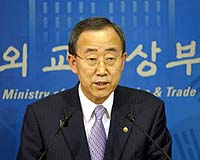| . |  |
. |
Sydney (AFP) Sept 4, 2009 An Australian scientist Friday launched what he called a "reef and beef" study into whether feeding cows seaweed would reduce their flatulent carbon emissions, in a move that could help save the Great Barrier Reef. Tony Parker, from James Cook University, said cattle produced up to 20 percent of global man-made methane emissions, and the problem was largely linked to their diet. At least 50 percent of these cows lived in developing nations, many of which were in the tropics, where the quality of pasture tended to deteriorate in the winter, increasing emissions, Parker said. "Seaweed, algae and other sea grasses have been proven to be much more digestible than land grass because they have less cellulose and more starch," added Parker's research partner Rocky de Nys. "A better diet for cattle, then, will encourage better digestion and thus lead to a decrease in methane emissions." Methane gas from livestock accounts for about 12 percent of Australia's annual greenhouse emissions, with flatulence from 120 million sheep, cows and goats comprising its third-largest source of damaging gases. The average beef cow expels the equivalent of around 1,500 kilograms (3,300 pounds) of carbon per year. The scientists said that using seaweed as cattle fodder could also have wider benefits for the environment, by providing coastal farmers with a way to clean waterways that flowed into the Great Barrier Reef. Seaweed could be used to clear nitrogen and phosphorous from farming water, but few farmers adopted the method because they were left with "a huge biomass that they don't know what to do with," De Nys said. He said those nutrients were partly responsible for the breakdown of aquatic ecosystems within the iconic Barrier Reef, which authorities warned this week faced significant threats from climate change and farming runoff. "I like to call it the 'reef and beef' project because it has far reaching implications that come full circle: starting with seaweed, taking in the beef and aquaculture industries, and extending back out to the sea to help conserve the Great Barrier Reef," added Parker. Australia's centre-left government has committed to reducing emissions by at least five percent of 2000 levels by 2020, including the introduction by 2011 of a carbon trading scheme. Prime Minister Kevin Rudd has committed to deeper cuts of up to 25 percent if world leaders agree on an "ambitious" reduction plan at Copenhagen in December. Share This Article With Planet Earth
Related Links Climate Science News - Modeling, Mitigation Adaptation
 World heading for climate 'abyss': UN chief
World heading for climate 'abyss': UN chiefGeneva (AFP) Sept 3, 2009 The world is speeding towards a climate catastrophe, UN chief Ban Ki-moon warned on Thursday, urging rapid progress in talks to cut emissions and tackle global warming. "Our foot is stuck on the accelerator and we are heading towards an abyss," the UN secretary general said in a speech to the World Climate Conference. Ban, who this week visited the Arctic to witness first hand the change ... read more |
|
| The content herein, unless otherwise known to be public domain, are Copyright 1995-2009 - SpaceDaily. AFP and UPI Wire Stories are copyright Agence France-Presse and United Press International. ESA Portal Reports are copyright European Space Agency. All NASA sourced material is public domain. Additional copyrights may apply in whole or part to other bona fide parties. Advertising does not imply endorsement,agreement or approval of any opinions, statements or information provided by SpaceDaily on any Web page published or hosted by SpaceDaily. Privacy Statement |